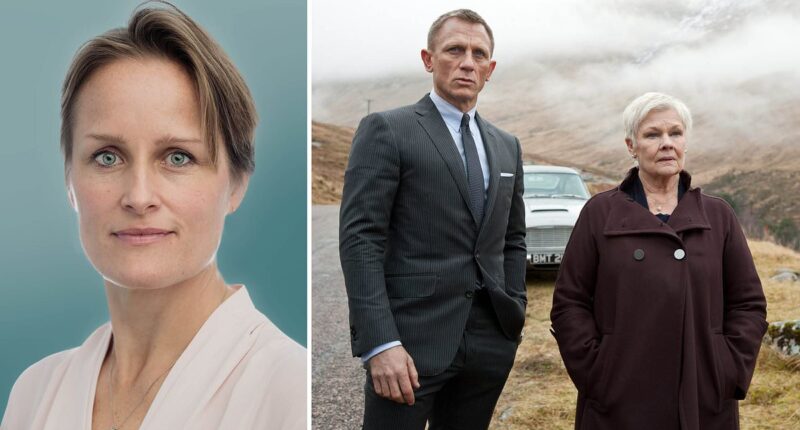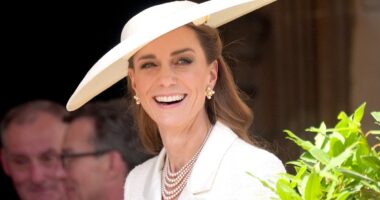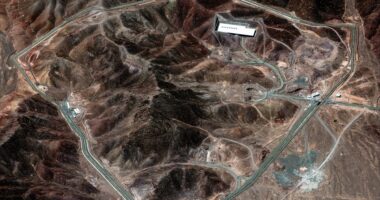MI6 will be led by a female spy chief for the first time in its 116-year-old history.
Blaise Metreweli has been appointed as the next head of the Secret Intelligence Service, replacing Sir Richard Moore in the autumn.
For decades, the 47-year-old has held some of the top roles in MI6, MI5 and the Foreign Office, but until now she has kept her true identity secret.
In contrast to how Ian Fleming depicted ‘blithering women who thought they could do a man’s work’ in his Bond novels, female spies have reached top positions in all UK intelligence agencies, except MI6.
It was 1995 when Dame Judi Dench became the first woman to take up the fictional ‘M’ character in the Bond movies.
However, in reality, it took a significantly long time to have a woman appointed to the role known as ‘C’. The current head of MI6 stated in 2023 that he aims to promote gender equality by ensuring that he is the last male-selected C, hinting at greater inclusivity in future selection processes.
Ms Metreweli will be the 18th chief in the organisation’s history when she takes up the reins on September 30.
This appointment comes at a critical juncture for Britain as it grapples with escalating threats from various adversaries. Sir Richard recently emphasized the severity of the current global situation, stating, ‘I’ve never seen the world in a more dangerous state.’

The first ever female Chief of the Secret Intelligence Service (MI6) has been announced by the Prime Minister today. Blaise Metreweli (pictured) will be the 18th chief in the organisation’s history

In contrast to Bond author Ian Fleming’s dismissive portrayal of ‘blithering women who thought they could do a man’s work’, female spies have risen to the top of every UK intelligence agency, apart from MI6. Pictured: Daniel Craig and Judi Dench as James Bond and M in 2012 Bond film Skyfall

It was 1995 when Dame Judi Dench (pictured as M in 2012 James Bond film Skyfall) became the first woman to take up the fictional ‘M’ character in the Bond movies
But Ms Metreweli has spent her career dealing with threats, once saying the beauty of her job was ‘from morning to night, I look at where we can do our utmost to prevent harm’.
She joined MI6 in 1999 first as a case officer, then agent runner, after studying social anthropology at Pembroke College, Cambridge where she rowed for the university.
In one interview given anonymously in 2021, she described herself as being ‘really fascinated by human behaviour and how and why people act’, claiming anthropology was ‘really useful for this job because it isn’t really about states doing this to each other. It is individuals who do this.’
She told The Telegraph at the time: ‘Our adversaries are people and the victims are people and it is really important to see it on that level.
‘I have lived in countries throughout my career where democratic principles and freedoms sometimes disappear overnight, or a free press squashed, and it makes you realise quite how special the UK is.
‘It is really rare and really worth protecting.’
MI6’s new spy chief is keen to dispel the myths about the job being like James Bond, ‘old school movies and novels territory’.
She said female spies were a world away from the stereotypes in films where ‘women in particular in this world are portrayed as psychologically damaged in some way’.

The appointment comes at a time when Britain faces unprecedented threats from adversaries. Pictured: Headquarters of the Secret Intelligence Service in London
After two decades at MI6 in operational roles in the Middle East and Europe, she transferred to the domestic spy agency where she presided over MI5’s hostile states counter intelligence and oversaw the UK’s response to the threat of cyber attacks.
She was also responsible for the protective security of UK’s national infrastructure.
While at MI5, she called for the reform of the Official Secrets Act before the National Security Act made it illegal to spy for Britain’s enemies.
Last year, she was presented with the Order of Saint Michael and Saint George by the King for ‘services to British foreign policy’ when she was Director General of the Foreign, Commonwealth and Development Office.
Currently, Ms Metreweli is known as ‘Director General Q’, responsible for technology and innovation in MI6.
Yesterday she said: ‘I am proud and honoured to be asked to lead my Service. MI6 plays a vital role – with MI5 and GCHQ – in keeping the British people safe and promoting UK interests overseas. I look forward to continuing that work alongside the brave officers and agents of MI6 and our many international partners.’
The Prime Minister said: ‘The historic appointment of Blaise Metreweli comes at a time when the work of our intelligence services has never been more vital.
‘The United Kingdom is facing threats on an unprecedented scale – be it aggressors who send their spy ships to our waters or hackers whose sophisticated cyber plots seek to disrupt our public services.

She will replace Sir Richard Moore (pictured) in the autumn
‘I’d like to thank Sir Richard Moore for his dedicated service, and I know Blaise will continue to provide the excellent leadership needed to defend our county and keep our people safe – the foundation of my Plan for Change.’
Yesterday Sir Richard said: ‘I am absolutely delighted by this historic appointment of my colleague, Blaise Metreweli to succeed me as “C”.
‘Blaise is a highly accomplished intelligence officer and leader, and one of our foremost thinkers on technology. I am excited to welcome her as the first female head of MI6.’
Foreign Secretary David Lammy said: ‘I am delighted to appoint Blaise Metreweli as the next Chief of MI6. With a wealth of experience from across our national security community, Blaise is the ideal candidate to lead MI6 into the future.
‘At a time of global instability and emerging security threats, where technology is power and our adversaries are working ever closer together, Blaise will ensure the UK can tackle these challenges head on to keep Britain safe and secure at home and abroad.
‘I would also like to pay tribute to Sir Richard Moore for his service and leadership. I have worked closely with him over the past year and thank him for his valuable contribution enhancing our national security and protecting the British public.’

















